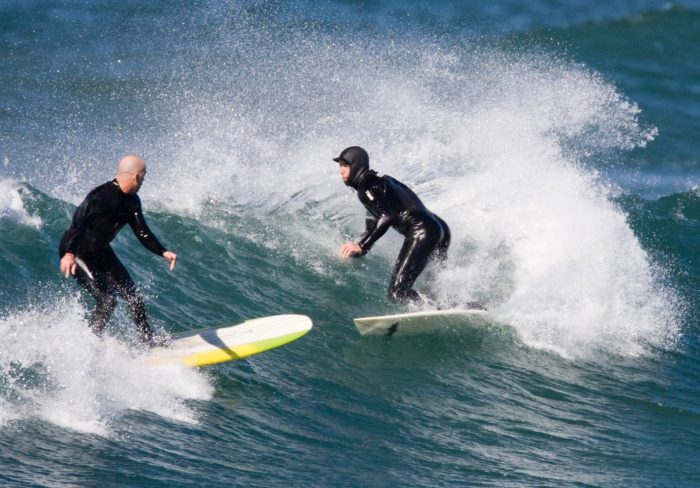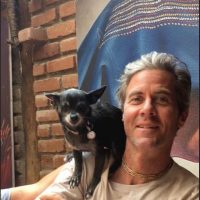Stoked—it’s surfer jargon for happiness and being in the flow.
I had been feeling stoked for weeks.
There had been some solid south swell arriving from the southern hemisphere, with light winds and small crowds at my local Southern Mexico surf breaks.
It seemed as though every wave I paddled for I got. Every move I made on my board was perfectly aligned with the water. Pivoting here and weight to the board there.
On days like these, I couldn’t distinguish if my toes were on the nose of a surfboard or pirouetting on the edge of the mysteries of the sea. Stoked—for days, I was in the flow—until I wiped out.
I was surfing at The Rock, going right, while out of the corner of my eye, I saw a beginner surfer doing something beginner surfers do all of the time: unintentionally getting in our way.
This particular smiling newbie paddled right toward me and into my path down the wave. I don’t blame him. I could have predicted it. But unfortunately, surf hubris blurred my vision, and rather than doing something easy to avoid contact, I did something difficult to avoid contact—after all, I was feeling the flow.
Luckily for the newbie, I just missed him, but my stupid stunt sent me flying awkwardly into the air, with my face and chin coming down violently against my surfboard.
As suddenly as a bird smashing into a window on a blue-sky day, my chin smashed into the edge of my unforgiving four-inch-thick SUP-surfboard.
Wounded and swirling underwater, I watched fancy white bubbles sparkle with pulsating light and lacked the normal urgency to return to the surface to breathe. I almost blacked out but didn’t.
But underwater, in my semi-conscious state, I felt a lack of humanness. I was more fish than person, more water than a body with bones. I was all air and no breath—white bubbles sparkling with pulsating light.
Instinctively, or maybe biologically, I floated up to the surface of the water. I gathered myself and eventually bled my way out of the water, passing a few gawking children playing in the sand, and drove myself to the hospital.
Although I held my shirt against my chin to slow the bleeding, the looks of shock from the hospital reception staff communicated that it was serious: “What? You haven’t seen blood dripping down a half-naked surfer before?”
The hospital staff gathered their strength and formed a procession, a greeting line of sorts, all with the same question, “How did you do that?” My answer was, “Yo pego mi ahhheaa de surfear coiu mie ughtqzz…”
My jaw and mouth didn’t seem to have a desire to enunciate words well. After harmonizing the new arrangement between my brain and my newly mangled mouth, I delivered my speech to the audience.
The nurses, behind their COVID-19 personal protective gear, got busy cleaning pieces of sand and fragments of surfboard fiberglass out of my jaw, poking me with an I.V., and clearing away the considerable blood.
The spontaneous kindness and care felt like the best of us. Their compassion flashed a vision of the opposite. I thought of the harm we do to each other—the wars, the bad marriages, child neglect, or worse sexual abuse, and the cruelty to animals in slaughterhouses and on factory farms.
I considered the harm I’d done to myself and others with my prior sketchy drug addiction and alcoholism, my general lack of care for life. The harmful human shadow looms around us, but so does kindness. With gentle touches to my face and jaw, I felt cared for and loved.
Since they were concerned about a possible broken jaw, I was wheeled in front of a big machine and introduced to a nurse named Nayeli. Nayeli works the ultrasound machine. Nayeli also happens to be the name of our daughter’s cat. Nayeli means “I love you” in the language of the Zapotec Indians of Mexico.
Love—there can never be too much love in the world. We are cared for and receive love in ways that are seen and unseen. It was in those ways, the serendipitous ways of how love altered me on that day.
Rolling into surgery, the anesthesiologist asked me if I wanted the happy pill, the one that would relax me for surgery. I assured him that I was feeling quite relaxed.
The pain wasn’t going to be a problem, and we both decided on local anesthesia in my mouth and on my chin.
The doctor then asked what kind of music I liked and wanted to listen to during the surgery. I queried if they knew Juanes. You know, the super guapo Colombiano who plays guitar and sings like his heart is on fire?
Before I finished the sentence, Juanes’ melodies filled the room. The nurses sang along as I unexpectedly began to fight back the tears while lying prone on the surgery table.
Evidently, being patched back together, like pieces of a puzzle, 44 stitches in total, while listening to Juanes, is emotional. The good kind of emotional—like being stoked.
Tears formed in my eyes as if an ocean wave approached on the horizon. Slowly cresting. They were salty tears. Tears of gratitude and connection. Tears of kindness. Tears of wholeness. Silent tears with my eyes closed.
Dreaming of a kinder world, a way of unity that touches animals, humans, and our Earth with compassion, dreaming of surfing in the flow.
~



Read 6 comments and reply